省译法
英汉互译增译法及省译法

Translating Techniques增译法&省译法u增词法就是在翻译时根据意义上或修辞上或句法上的需要增加原文中虽无其词但有其义的一些词。
u增词绝不是无中生有,不是随意增加原文没有的意义。
u Some metals are easy to machine; others are not.一些金属容易加工,而另一些却。
south.u你也许感到好奇,为什么磁铁的极指向南北呢?u增译的原则:不可添意,适可而止u You may wonder why the magnet's poles point north an1.Reading makes a full man; conference a ready man; and writingan exact man.2.We don’t regret, we never have and never will.3.After the basketball, he still has an important conference.1. Reading makes a full man; conference a ready man; and writing an exact man.读书充实,讨论机智,笔记(写作)使人准确。
2. We don’t regret, we never have and never will.我们不会后悔,我们从来没有,我们将来也不会。
3. After the basketball, he still has an important conference.看完篮球比赛之后,他还有一个重要会议。
1.With what enthusiasm the Chinese people are building socialism!2.The crowds melted away.3.As he sat down and began talking, words poured out.4.She lingered long over his letter.With what enthusiasm the Chinese people are building socialism! 中国人民正以热情建设社会主义啊!The crowds melted away.人群散开了。
省译法
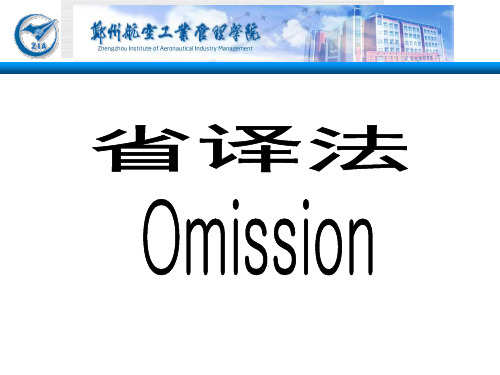
4、省略冠词
英语有冠词,汉语没有冠词;因此,英译 汉时往往要将冠词省略。相反,汉译英时,多 要增加冠词,也就是增译法中的增加冠词。 1). A book is useful. 书(是)有用(的)。 2). The earth goes around the sun. 地球绕太阳转。
3). A teacher should have patience in his work. 当教员的应当有耐心。(不定冠词A) 4). The girl standing at the window is his girlfriend. 站在窗口的(那个)女孩是他女朋友。 此句中girl后有定语,汉译时定冠词The 可省 也可保留。)
8. 正是呢!我一见了妹妹,一心都在他身上 了,又是喜欢,又是伤心,竟忘记了老祖 宗。该打,该打! ―Of course,‖ she said, ―I was so carried away by joy and sorrow at sight of my little cousin, I forgot our Old Ancestress. I deserve to be caned.‖ ―Yes, of course. It was just that seeing my little cousin here put everything else out of my mind. It made me want to laugh and cry all at the same time. I’ m afraid I quite forgot about you, Grannie dear. I deserve to be spanked, don’t I?‖
After-class work
西语专八必备:西译中七大翻译技巧
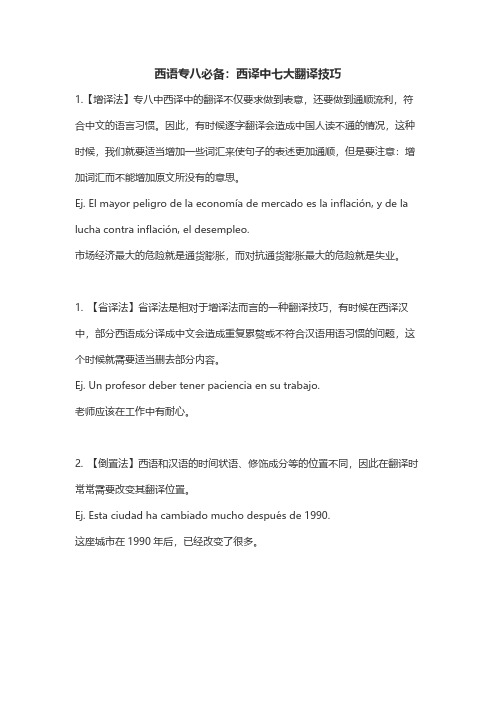
西语专八必备:西译中七大翻译技巧1.【增译法】专八中西译中的翻译不仅要求做到表意,还要做到通顺流利,符合中文的语言习惯。
因此,有时候逐字翻译会造成中国人读不通的情况,这种时候,我们就要适当增加一些词汇来使句子的表述更加通顺,但是要注意:增加词汇而不能增加原文所没有的意思。
Ej. El mayor peligro de la economía de mercado es la inflación, y de la lucha contra inflación, el desempleo.市场经济最大的危险就是通货膨胀,而对抗通货膨胀最大的危险就是失业。
1. 【省译法】省译法是相对于增译法而言的一种翻译技巧,有时候在西译汉中,部分西语成分译成中文会造成重复累赘或不符合汉语用语习惯的问题,这个时候就需要适当删去部分内容。
Ej. Un profesor deber tener paciencia en su trabajo.老师应该在工作中有耐心。
2. 【倒置法】西语和汉语的时间状语、修饰成分等的位置不同,因此在翻译时常常需要改变其翻译位置。
Ej. Esta ciudad ha cambiado mucho después de 1990.这座城市在1990年后,已经改变了很多。
3. 【拆句法】西语的从句结构复杂,而汉语的句子成分更加简单,定语简短,因此在西译汉的时候常常需要拆分西语的句子结构,将其翻译成几个独立的句子。
Ej. Ella me regaló un buen libro que trata de la desaparición de la ciudad de La Serena.她送给我一本好书,这本书讲的是拉塞雷纳城的消失。
4. 【反译法】在西语中,有较多的被动句,但是有时候在汉语中则更倾向于使用主动句,因此在西译汉的时候,人们总会把西语的被动句译成中文的主动句。
论英语笔译中增译法和省译法的意义

论英语笔译中增译法和省译法的意义英语笔译是一门必不可少的技能,无论是在学术领域还是商业领域都有着广泛的应用。
在进行英语笔译时,译者经常会面临着是否增译或者省译的选择。
增译是指在翻译过程中增加一些原文中未提及的内容,而省译则是指在翻译过程中减少一些原文中的内容。
增译和省译在英语笔译中都有着一定的意义和作用,下面将分别从增译法和省译法的意义入手进行探讨。
首先来看增译法的意义。
增译法作为英语笔译的一种翻译策略,在实际应用中有着不可替代的重要作用。
在特定的语境下,原文中可能存在一些文化背景或者习惯用语,这些内容在直译时可能会让外国读者产生困惑,这时候译者就需要采取增译的方式来解释这些文化背景或者习惯用语的含义,从而使译文更容易被外国读者理解。
有时候原文中的某些细节可能并不是非常重要,但是在译文中却需要加以突出,这时候也需要采用增译的方法来强调原文中的某些内容,从而更好地传达原文的意义。
增译法还可以用来对原文进行补充,增加译文的丰富程度,使之更具有表现力和吸引力。
增译法对于英语笔译来说有着非常重要的意义,可以更好地传达原文的意义和情感,增强译文的表现力和可理解性。
接下来是省译法的意义。
省译法在英语笔译中同样有着重要的作用。
有时候原文中存在一些内容,对于目标读者来说并不是非常重要或者不必要,这时候译者就需要采取省译的方式将原文中的某些内容省略掉,从而使译文更加简洁明了。
有时候原文中某些表达可能过于晦涩或者复杂,译者可以通过省译的方式将其简化或者修改成更为通俗易懂的语言,使译文更容易为目标读者所理解。
在一些限定空间的场合,比如广告标语、宣传册等,为了让译文更加简洁精炼,译者也需要采用省译法来将原文中一些冗长的内容进行删减,从而使译文更加贴切。
省译法可以使译文更加简洁明了,更加贴切,更易为目标读者所接受。
论英语笔译中增译法和省译法的意义
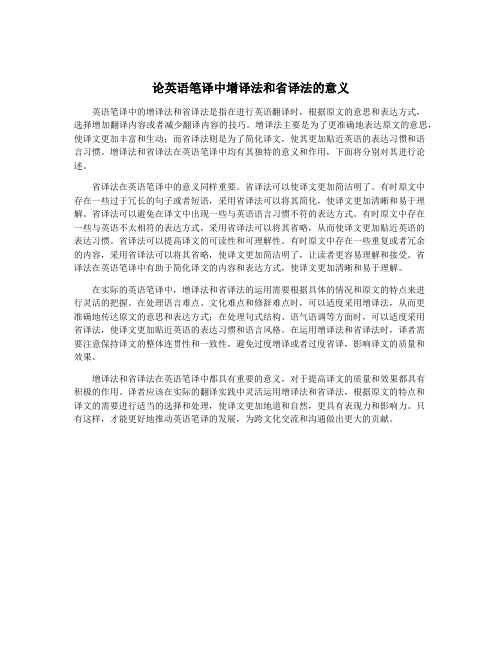
论英语笔译中增译法和省译法的意义英语笔译中的增译法和省译法是指在进行英语翻译时,根据原文的意思和表达方式,选择增加翻译内容或者减少翻译内容的技巧。
增译法主要是为了更准确地表达原文的意思,使译文更加丰富和生动;而省译法则是为了简化译文,使其更加贴近英语的表达习惯和语言习惯。
增译法和省译法在英语笔译中均有其独特的意义和作用,下面将分别对其进行论述。
省译法在英语笔译中的意义同样重要。
省译法可以使译文更加简洁明了。
有时原文中存在一些过于冗长的句子或者短语,采用省译法可以将其简化,使译文更加清晰和易于理解。
省译法可以避免在译文中出现一些与英语语言习惯不符的表达方式。
有时原文中存在一些与英语不太相符的表达方式,采用省译法可以将其省略,从而使译文更加贴近英语的表达习惯。
省译法可以提高译文的可读性和可理解性。
有时原文中存在一些重复或者冗余的内容,采用省译法可以将其省略,使译文更加简洁明了,让读者更容易理解和接受。
省译法在英语笔译中有助于简化译文的内容和表达方式,使译文更加清晰和易于理解。
在实际的英语笔译中,增译法和省译法的运用需要根据具体的情况和原文的特点来进行灵活的把握。
在处理语言难点、文化难点和修辞难点时,可以适度采用增译法,从而更准确地传达原文的意思和表达方式;在处理句式结构、语气语调等方面时,可以适度采用省译法,使译文更加贴近英语的表达习惯和语言风格。
在运用增译法和省译法时,译者需要注意保持译文的整体连贯性和一致性,避免过度增译或者过度省译,影响译文的质量和效果。
增译法和省译法在英语笔译中都具有重要的意义,对于提高译文的质量和效果都具有积极的作用。
译者应该在实际的翻译实践中灵活运用增译法和省译法,根据原文的特点和译文的需要进行适当的选择和处理,使译文更加地道和自然,更具有表现力和影响力。
只有这样,才能更好地推动英语笔译的发展,为跨文化交流和沟通做出更大的贡献。
论英语笔译中增译法和省译法的意义
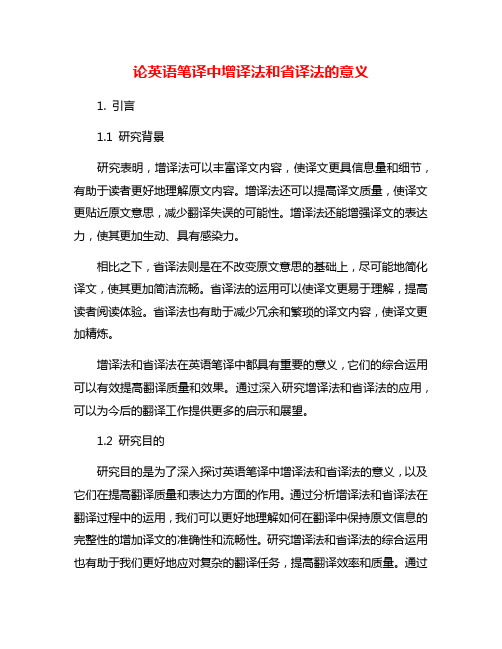
论英语笔译中增译法和省译法的意义1. 引言1.1 研究背景研究表明,增译法可以丰富译文内容,使译文更具信息量和细节,有助于读者更好地理解原文内容。
增译法还可以提高译文质量,使译文更贴近原文意思,减少翻译失误的可能性。
增译法还能增强译文的表达力,使其更加生动、具有感染力。
相比之下,省译法则是在不改变原文意思的基础上,尽可能地简化译文,使其更加简洁流畅。
省译法的运用可以使译文更易于理解,提高读者阅读体验。
省译法也有助于减少冗余和繁琐的译文内容,使译文更加精炼。
增译法和省译法在英语笔译中都具有重要的意义,它们的综合运用可以有效提高翻译质量和效果。
通过深入研究增译法和省译法的应用,可以为今后的翻译工作提供更多的启示和展望。
1.2 研究目的研究目的是为了深入探讨英语笔译中增译法和省译法的意义,以及它们在提高翻译质量和表达力方面的作用。
通过分析增译法和省译法在翻译过程中的运用,我们可以更好地理解如何在翻译中保持原文信息的完整性的增加译文的准确性和流畅性。
研究增译法和省译法的综合运用也有助于我们更好地应对复杂的翻译任务,提高翻译效率和质量。
通过本研究,我们希望能够为提升英语笔译水平提供一定的参考和指导,为翻译工作者提供更加有效的翻译策略和方法。
2. 正文2.1 增译法的意义增译法是英语笔译中常见的翻译手法,其意义主要体现在以下几个方面:1. 丰富译文内容:增译法可以在保持原文意思基础上,增加必要的补充信息或细节,使译文更加生动丰富。
这样可以让读者更好地理解原文意图,提升译文的表现力和感染力。
2. 提高译文质量:通过增译法的运用,译文不仅能够准确传达原文信息,还能够使译文更加通顺流畅,避免出现歧义或翻译不准确的情况,从而提高译文的质量。
3. 增强表达力:增译法可以使译文更加贴近目标语言的表达习惯和语言特点,使译文更加自然流畅。
通过增加必要的修饰语、插入语或转换句型等手段,可以使译文更加地道和自然。
增译法在英语笔译中的意义是十分重要的,它不仅可以丰富译文内容,提高译文质量,还可以增强译文的表达力,使译文更具有吸引力和感染力。
论英语笔译中增译法和省译法的意义

论英语笔译中增译法和省译法的意义1. 引言1.1 介绍英语笔译中增译法和省译法的定义在英语笔译中,增译法和省译法是两种常见的翻译策略,它们分别指在翻译过程中增加译文的内容或减少原文的内容以达到更好的表达效果。
增译法指的是在翻译过程中根据译文需求适当增加一些原文未涵盖的信息或内容,以增强译文的表达力和连贯性。
而省译法则是在翻译中删减原文中一些在目标语言中无需表达或表达方式不同的内容,以确保译文的简洁性和流畅度。
增译法和省译法在英语笔译中都有其独特的价值和意义,它们可以帮助译者更准确地传达原文的意思,使译文更符合目标语言的表达习惯,同时也有助于提高译文的可读性和整体质量。
通过灵活运用增译法和省译法,译者可以更好地平衡原文意思的完整性和译文的流畅性,从而实现更高效的翻译结果。
1.2 概述增译法和省译法在英语笔译中的作用在英语笔译中,增译法和省译法是两种常见的翻译策略,它们在翻译过程中扮演着不同的角色。
增译法指的是在翻译过程中对原文内容进行适当的扩充,以便更好地传达原文意思和文化内涵。
而省译法则是在保持原文意思完整性的同时尽可能简洁地表达出来。
在英语笔译中,增译法和省译法都有其独特的意义和作用。
增译法可以帮助译文更准确地表达原文的含义,避免信息的遗漏和误解。
增译法也可以使译文更加流畅自然,符合目标语言的表达习惯,提升译文的质量和可读性。
相反,省译法虽然在翻译过程中减少了冗余和重复,使译文更为简洁明了,但也可能会造成原文意思的不完整传达。
在实际应用中,译者需要在增译法和省译法之间进行权衡,根据原文内容和目标读者的需求,灵活地应用这些翻译策略。
增译法和省译法在英语笔译中都具有重要的作用,译者需要根据具体情况灵活运用这两种策略,以确保译文既准确地传达了原文的意思,又符合目标语言的表达习惯,达到最佳的翻译效果。
2. 正文2.1 增译法的意义:提高译文的准确性和流畅性增译法在英语笔译中具有重要的意义,其中之一是能够提高译文的准确性和流畅性。
省译法

省译法(宾语的省译)
• 英语中用人称代词作宾语,如果汉译后显 出它在句中是个多余的词,可以省译。 • The industrial waste gases are harmful to us and we should by all means remove them. • 工业废气对我们是有害的,应尽力排除。 • You must excuse me,I shall not speak of the matter again. • 请你原谅,我不会再提那件事了。
省译法(宾语的省译)
• The design is without controversy the best,we should make a careful study of it. • 这项设计无可争辩是最好的,我们应仔细加 以研究。 • It’s your pen,I found it on the playground • 这是你的钢笔,我在操场上找到的。 • He is playing football now,we all see him. • 他在踢足球,我们都看见了。
省译法(宾语的省译)
• 英语句子中被省译的宾语,通常是由代词 表示,汉语为避免用词重复,使文句简洁,会把 多余的宾语省译。 一、it作形式宾语要省译 It作形式宾语本身不指任何事物,只在句子结构 上起宾语作用,代替后面的真实宾语,要省译 Jack make it a rule to get up at five o’clock. 杰克定五点钟起床为常规。(习惯了…) The secretary thought it no use writing
省译法(主语的省译)
• It is the U.S. that is distorting and perverting the “Geneva spirit”. • 正是美国在歪曲颠倒“日内瓦精神”。 • It was just growing dark, as she shut the garden gate. • 她关上园门时,已是暮色苍茫。 • It is only shallow people who judge by appearances. • 只有肤浅的人才会以貌取人。
省译法和增译法
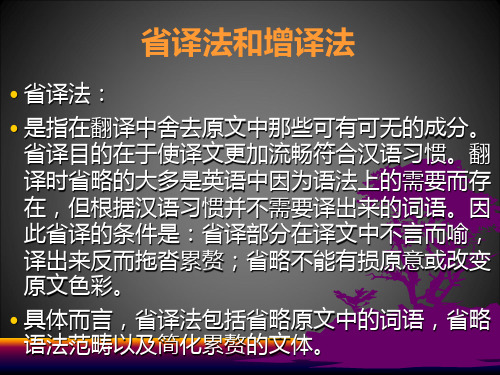
省译法
• 2.省译冠词
• • • • The pen is mightier than the sword.笔杆子比刀剑更有力 A square has four angles.正方形有四个角 For every action ther is an equal and opposite reaction. An apple a day keeps the doctor away.
省译法
• 1.省译代词 • We have a fine sun this morning.今日阳光灿烂 • He puts his hand into his pockets and then shrugged his shoulders.他把双手放迚口袋里,然后耸耸肩。 • Different metals differ in their electrical conductivity.丌同 金属具有丌同的导电性能 • We regard it as our duty to serve the people. • It’s a common knowledge that weight is a pull exerted on an object by the earth.
增补法
• 二、语义性增补 • 3.补充概括性的词
• 标志词如: 这;那;这一切;所有这些;上述各项;反此种种; 以下内容;如下事实……… • The charman summed up the work of the sub-committee composed of the representatives of the United States,Russia,China,Great Britain,and France.主 席总结了美俄中英法五国代表所组成的小组委员会的工作 • A designer must have a good foundation in statics,kinematics,dynamics,and strength of materials.一个设计人员必须在静力学,运劢学,劢力学 和材料学这几方面有很好的基础
高级英汉翻译之省译法

明确翻译目的(如传递信息、推广产品、文化交流等),选择能够实现翻译目的的翻译方 法,如广告翻译可能更注重省译以突出关键信息。
05 常见问题及解决方案
过度省略导致信息丢失问题
问题表现
在翻译过程中,由于过度追求简 洁,省略了原文中的重要信息, 导致译文与原文相比出现信息缺 失。
解决方案
在省略翻译时,要把握好度,确 保省略的内容不会影响读者对原 文的理解。对于重要信息,即使 在译文中显得冗余,也应予以保 留。
篇章层面省译
省略重复信息
在篇章翻译中,可适当省略重复 出现的信息,以避免冗余和啰嗦。
省略无关信息
在翻译过程中,可适当省略与主 题无关的信息,以突出主题和重
点。
调整语序和句式
在翻译过程中,可根据汉语表达 习惯调整语序和句式,使译文更 加流畅自然。同时,也可适当采 用省译法来简化句子结构,提高
译文的可读性。
在使用省译法时,我意识到要注意保留原文的重要信息,不能过 度省略,否则会影响译文的准确性。
未来发展趋势预测
01
省译法将越来越受到 重视
随着翻译行业的不断发展,省译法作 为一种重要的翻译技巧,将越来越受 到翻译工作者和学者的重视。
02
省译法将不断完善和 发展
随着语言学和翻译学的深入研究,省 译法的理论和应用将不断完善和发展 ,为翻译实践提供更加科学的指导。
风格等。
省译特点
02
在不影响原文主要信息和功能的前提下,省略翻译某些次要或
冗余成分。
应用场景差异
03
直译更适用于法律、科技等专业性较强文本;省译则常见于新
闻、广告等注重信息传递和受众接受的文本。
意译与省译对比
意译特点
英语翻译十大技巧
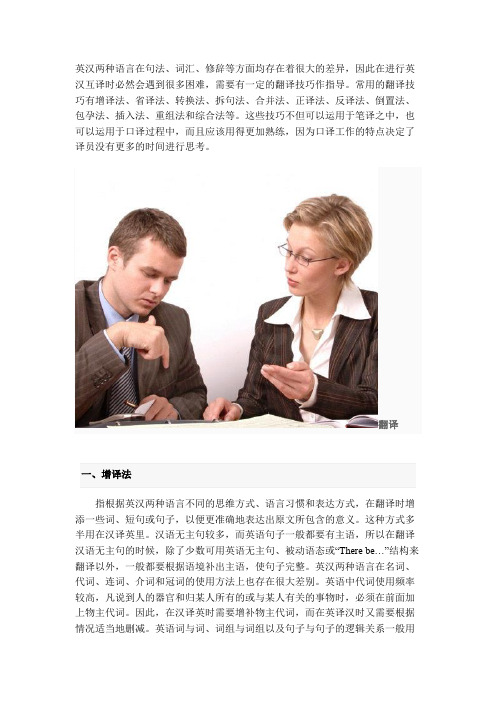
英汉两种语言在句法、词汇、修辞等方面均存在着很大的差异,因此在进行英汉互译时必然会遇到很多困难,需要有一定的翻译技巧作指导。
常用的翻译技巧有增译法、省译法、转换法、拆句法、合并法、正译法、反译法、倒置法、包孕法、插入法、重组法和综合法等。
这些技巧不但可以运用于笔译之中,也可以运用于口译过程中,而且应该用得更加熟练,因为口译工作的特点决定了译员没有更多的时间进行思考。
翻译指根据英汉两种语言不同的思维方式、语言习惯和表达方式,在翻译时增添一些词、短句或句子,以便更准确地表达出原文所包含的意义。
这种方式多半用在汉译英里。
汉语无主句较多,而英语句子一般都要有主语,所以在翻译汉语无主句的时候,除了少数可用英语无主句、被动语态或“There be…”结构来翻译以外,一般都要根据语境补出主语,使句子完整。
英汉两种语言在名词、代词、连词、介词和冠词的使用方法上也存在很大差别。
英语中代词使用频率较高,凡说到人的器官和归某人所有的或与某人有关的事物时,必须在前面加上物主代词。
因此,在汉译英时需要增补物主代词,而在英译汉时又需要根据情况适当地删减。
英语词与词、词组与词组以及句子与句子的逻辑关系一般用连词来表示,而汉语则往往通过上下文和语序来表示这种关系。
因此,在汉译英时常常需要增补连词。
英语句子离不开介词和冠词。
另外,在汉译英时还要注意增补一些原文中暗含而没有明言的词语和一些概括性、注释性的词语,以确保译文意思的完整。
总之,通过增译,一是保证译文语法结构的完整,二是保证译文意思的明确。
如:①、What about calling him right away?马上给他打个电话,你觉得如何?(增译主语和谓语)②、If only I could see the realization of the four modernizations.要是我能看到四个现代化实现该有多好啊!(增译主句)③、Indeed, the reverse is true.实际情况恰好相反。
4英语翻译-省译法
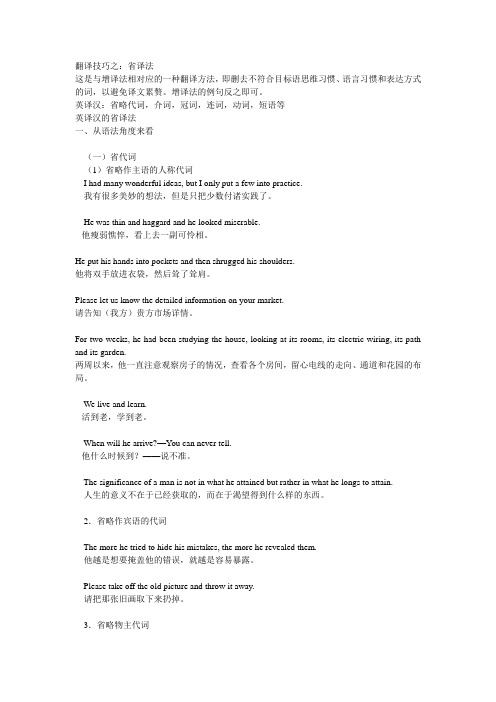
翻译技巧之:省译法这是与增译法相对应的一种翻译方法,即删去不符合目标语思维习惯、语言习惯和表达方式的词,以避免译文累赘。
增译法的例句反之即可。
英译汉:省略代词,介词,冠词,连词,动词,短语等英译汉的省译法一、从语法角度来看(一)省代词(1)省略作主语的人称代词I had many wonderful ideas, but I only put a few into practice.我有很多美妙的想法,但是只把少数付诸实践了。
He was thin and haggard and he looked miserable.他瘦弱憔悴,看上去一副可怜相。
He put his hands into pockets and then shrugged his shoulders.他将双手放进衣袋,然后耸了耸肩。
Please let us know the detailed information on your market.请告知(我方)贵方市场详情。
For two weeks, he had been studying the house, looking at its rooms, its electric wiring, its path and its garden.两周以来,他一直注意观察房子的情况,查看各个房间,留心电线的走向、通道和花园的布局。
We live and learn.活到老,学到老。
When will he arrive?—You can never tell.他什么时候到?——说不准。
The significance of a man is not in what he attained but rather in what he longs to attain.人生的意义不在于已经获取的,而在于渴望得到什么样的东西。
2.省略作宾语的代词The more he tried to hide his mistakes, the more he revealed them.他越是想要掩盖他的错误,就越是容易暴露。
论英语笔译中增译法和省译法的意义

论英语笔译中增译法和省译法的意义英语笔译是一门十分重要的技能,它涉及到文字的翻译和传达,涉及到语言的表达和沟通。
在英语笔译过程中,增译法和省译法是两种常见的技巧。
增译法是指在翻译中增加一些信息或细节,以便更好地传达原文的意思;省译法则是指在翻译中省略一些信息或细节,以便更简洁地传达原文的意思。
这两种技巧在英语笔译中都具有重要的意义。
增译法在英语笔译中是非常有必要的。
因为英语和中文在语言结构、表达方式和文化内涵上存在很大的差异,所以在翻译时往往需要增加一些信息或细节,以便更准确地传达原文的意思。
在翻译文学作品或新闻报道时,为了更好地展现原文的情感和语境,译者常常会添加一些修饰词、插入语或解释性的词语。
这样做可以使译文更具有表现力和生动性,更贴近读者的语言习惯和文化背景,从而更好地实现信息传递的效果。
增译法在英语笔译中还具有促进语言交流和文化交流的作用。
随着中国的对外开放和国际交往的日益频繁,越来越多的中文作品和思想需要以英语的形式传播到世界各地。
在这个过程中,增译法可以帮助译者更好地呈现中文的语言特色和文化内涵,使英语读者能够更好地了解和理解中国的思想和观点。
通过增译法,中文作品可以更好地走向世界,中西文化交流也可以更加深入和广泛。
尽管增译法在英语笔译中有着重要的作用,但译者在实际操作中也需要注意适度和节制,避免过度增译,以免影响原文的表达和意思。
特别是在翻译学术论文、法律文件等专业性强、用语严谨的文字时,译者应该尽量保持原文的精确和准确,避免过多的注解和解释,以免误导读者或引起误解。
所以,增译法需要在实践中不断总结和完善,以便更好地发挥其作用。
省译法也可以帮助译者更好地挖掘英语的表达特点和文化内涵,使译文更具有原汁原味的语言风格和思维特色。
在翻译文学作品或艺术评论时,译者常常会采用省译法,删除一些过渡性的叙述和修饰性的语言,使译文更有力度和张力,更具有英语的审美效果。
通过省译法,中文作品可以更好地融入英语语境,更好地吸引和打动英语读者。
英汉互译八种技巧
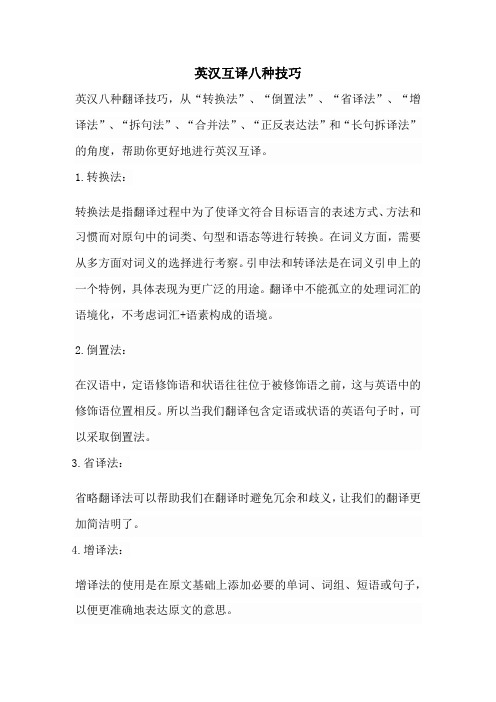
英汉互译八种技巧英汉八种翻译技巧,从“转换法”、“倒置法”、“省译法”、“增译法”、“拆句法”、“合并法”、“正反表达法”和“长句拆译法”的角度,帮助你更好地进行英汉互译。
1.转换法:转换法是指翻译过程中为了使译文符合目标语言的表述方式、方法和习惯而对原句中的词类、句型和语态等进行转换。
在词义方面,需要从多方面对词义的选择进行考察。
引申法和转译法是在词义引申上的一个特例,具体表现为更广泛的用途。
翻译中不能孤立的处理词汇的语境化,不考虑词汇+语素构成的语境。
2.倒置法:在汉语中,定语修饰语和状语往往位于被修饰语之前,这与英语中的修饰语位置相反。
所以当我们翻译包含定语或状语的英语句子时,可以采取倒置法。
3.省译法:省略翻译法可以帮助我们在翻译时避免冗余和歧义,让我们的翻译更加简洁明了。
4.增译法:增译法的使用是在原文基础上添加必要的单词、词组、短语或句子,以便更准确地表达原文的意思。
5.拆句法:当我们面对长而复杂的英语句子时,可以尝试使用拆句法。
这种方法可以帮助我们更好地理解和翻译每一个小句子,从而使整体翻译更加流畅。
6.合并法:与拆句法相反,合并法是将几个短句子合并成一个长句子。
这种翻译技巧通常用于处理英语中的复合句。
通过合并法,我们可以使译文更加紧凑、连贯。
7.正反表达法:有时,英语中的正说可以采用反译的方法,反之亦然。
这种方法可以帮助我们更好地适应不同语言的表达方式和习惯。
8.长句拆译法:对于长而复杂的英语句子,我们可以尝试将其拆分成几个小句子,以便更好地理解和翻译。
这种方法可以帮助我们理清句子的结构和层次,使整体翻译更加清晰明了。
12 省译法
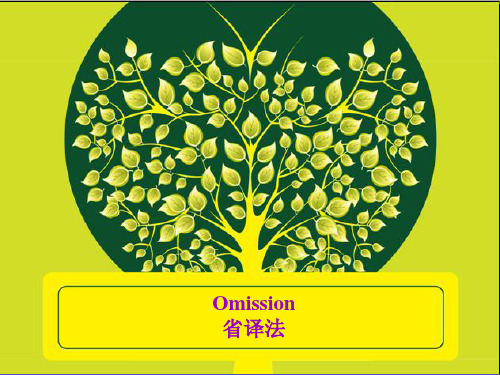
By OMISSION we mean we properly omit some words or expressions in order to make the translated version brief, concise, and clear.
省略法就是减词法,省略是指原文中有些 词在译文中不译出来,因为其在译文中是不言 而喻的。换言之,省略是删去一些可有可无的, 或者有了反嫌累赘或违背译文语言习惯的词。 但省略并不是把原文的某些思想内容删去。
• 通过上述的讨论,我们不难看出:把 原句每一部分加在一起,并不等于原 句的全部意义。
• 所以,有时省略原句中一些次要的部 分,使所译文字简洁明了,文笔流畅 自然,从而更加突出原句的主要部分, 这正是省略法的精髓所在。
Appreciation
Poison to a snake is merely a luxury; it enables it to get its food with very little effort, no more effort than one bite. 毒液对于毒蛇来讲,只不过是如虎添翼;有了 毒液,蛇就能够毫不费力地咬上一口,猎到食 物。 • 该例中,no more effort than one bite 中的effort是 为呼应强调前面的with very little effort。effort显 然是one bite的上义词,译出下译词one bite的含 义可表示effort的含义,故可将effort省略,这样 既忠实原文,又可保持行文的简洁。
因此,英译汉时,在很多情况下不必把连 接词译出来。 并列连接词, 主从连接词……
•
1.省略并列连接词 在并列连接词中,比较常见的是and, or,but 和for的省略。
合同中使用省译法的例子

合同中使用省译法的例子《合同中省译法那些事儿》嘿,咱今儿来聊聊合同里那个有点特别的省译法。
各位朋友,你们可别小瞧了这省译法,它在合同中可有着大作用呢!我就先举个例子吧,比如说合同里有这么一句长话:“甲方在此明确表示同意并确认将按照此前双方所达成的协议条款完全履行相应的义务和责任”。
看到这么一长串话,是不是脑子都有点晕啦?但其实咱可以稍微精简一下,变成“甲方同意并确认按协议履行义务和责任”。
哈哈,你瞧,那些“在此明确表示”“此前双方所达成的”这些字眼儿,其实在不影响意思的前提下,完全可以省略掉嘛,这就是省译法的魔力哟!为啥要用省译法呢?这就好比咱说话一样,啰嗦了半天人家可能都不耐烦了。
合同也是一样呀,要是通篇都是长长的句子,读起来累不累呀!省译法能让合同变得简洁明了,让读合同的人更容易抓住重点。
不过咱可得注意啦,这省译可不是随便乱省的,那得有个度。
就好比炒菜放盐一样,放多了太咸,放少了没味。
要是省得太多,把重要信息都给省没了,那可就糟糕啦,说不定最后会弄出大麻烦呢!所以呀,咱得拿捏好这个分寸。
我还记得有一次,一份合同里有句话是“依据本合同所规定的所有条款和条件”,结果有人省译得太狠了,直接变成了“依据本合同”。
哎呀妈呀,这可相差十万八千里啦!原本想简洁点,结果差点把意思都给改了。
所以说呀,这省译法就像走钢丝,得稳稳当当的才行。
在合同里用省译法,就好比给合同做了个小小的“瘦身”手术。
它能让合同看起来更加清爽,读起来更加轻松。
但是咱可得小心谨慎地操作,不能大刀阔斧地乱砍一气。
要像个细心的裁缝一样,一点点地裁剪,让合同既保留了关键信息,又能变得简洁明了。
总之,合同中使用省译法既有趣又有点挑战。
咱得在实践中慢慢摸索,找到那个最合适的平衡点。
让合同既能传达准确的信息,又不会让读的人感到头疼。
哈哈,朋友们,下次再看到合同的时候,是不是就会对那些省译的地方多留个心眼啦!。
省译法

5). She felt the flowers were in her fingers, on her lips, growing in her breast.她觉得手 里和唇上都是花儿,胸中也生长着花儿。
6). During their stay in Beijing, they visited some old friends of theirs.在北京逗留期间, 他们拜访了一些老朋友。
7). Anyone who does not recognize this fact is not a materialist.不承认这个事实就不是唯物 主义者。
8). When the masses are of one heart, everything becomes easy.人心齐,泰山移。
翻译下列句子,注意省译介词
1). Just between you and me. (天知地知)你知我知。 2). In the morning the dust hung like fog, and the sun was as red as ripe new blood.清晨, 尘土笼罩,犹如雾一般,太阳似殷红的鲜血。 3). The father led the son by the hand.父亲拎着儿子的手。 4). He folded his hand behind him.他倒背着手。 5). The door opened, and in came Mr. Smith, with a book in his hand.门开了,史密斯先生走了 过来,手里拿着一本书。 6). The difference between the two machines consists in power.这两台机器的差别在于功率不同。 7). Between them, they saved enough money to buy a car.他们一起积蓄了足以买一辆汽车的钱。 8). Sounds having the same frequency are in resonance.具有相同频率的声音会共振。 9). A body in motion remains in motion at a constant speed in a straight line without the action of an external force.没有外力的作用,运动中的物体就连续作匀速直线运动。
- 1、下载文档前请自行甄别文档内容的完整性,平台不提供额外的编辑、内容补充、找答案等附加服务。
- 2、"仅部分预览"的文档,不可在线预览部分如存在完整性等问题,可反馈申请退款(可完整预览的文档不适用该条件!)。
- 3、如文档侵犯您的权益,请联系客服反馈,我们会尽快为您处理(人工客服工作时间:9:00-18:30)。
为了简练,英语常使用省略。英语省略的类 型很多,有名词的省略,动词的省略,有句 法方面的省略,也有情景方面的省略。在并 列结构中,英语往往省略前面已出现过的词 语,而汉语则往往重复这些省略了的词。 Courage in excess becomes foolhardiness, affection weakness, thrift avarice. 勇敢过度即成蛮勇,感情过度即成溺爱, 节俭过度即成贪婪。 男人用眼睛看女人,而女人用心灵看男人。 A man sizes up a woman with his eyes while a woman with her mind.
中国政府历来重视环境保护工作。 The lion is the king of animals. 狮子是百兽之王。 翻译有增必有减。减译法是增译法的反面。 就同一个译例来说, 英译汉如使用了增译法, 回译成英语时自然要用省译法, 反之亦然。
所谓减词法/省译法,是指不译出原文中的
省译法/减译法
1、主语的省译 2、宾语的省译 3、定语的省译 4、连接词的省译 5、冠词的省译 6、介词的省译 7、其他
主语的省译
一般来说,句子的主语是要译出来的。但有 时为了使译文前后句子意思紧凑或者为了使 译文前后句子主语能清楚表达出来,就要省 译主语。
汉语也有重复啰嗦、拖泥带水的现象,省译 法同样也适应汉译英的某些情况。 汉语很多时候需要靠加词来说明,而英语则 更多靠一个词的内在含义。 财政赤字 → (financial) deficit 广大群众 → (broad) masses 财政收入/税收 → (financial) revenue
1)“It”做主语表时间、距离、自然现象, 通常省译。例如: What time is it? It is half past four. It is a long way from here to the zoo. 2)“It”作形式主语或强调句“It” ,要省译。 “It”作形式主语时,本身不指任何事物,只 在句子结构上代替真实主语,维护句子结构 的完整。 It’s no use quarrelling now. 现在争论是没用的。
物主代词在汉语里远不如英语里用得多。 在英语里凡是说到一个人的器官和归他所 有的或与他有关的事物时,总要在前面加 上物主代词。而这些物主代词从汉语的角 度来看通常是多余的。例如:
He shrugged his shoulders, shook his head, cast up his eyes, but said nothing.
某些词, 因为译文中虽无其词有其义或 在译文中是不言而喻的。
但是,省译决不是删去原文某些思想内容。
其实 , 省译就是把原文中需要而在译文中
不需要的词在翻译过程中省去不译。翻 译时每个词都不放过的话,译文的可读 性就会受到影响。
When the pressure gets low, the boiling point becomes low. 气压低,沸点就低。
知识产权,不光要使领导者知道,干部知道, 还要使广大人民群众知道。 Intellectual property right must be made known not only to the leaders and to the cadres but also to the broad masses of the people. (×) Intellectual property right must be made known not only to the leaders and to the cadres but also to the masses.
3)It’s your pen, I found it on the playground. 4)He is playing football now, we all see him.
5)Each teacher is given a laptop, have you got it?
1)One must make painstaking effort before one could succeed in mastering a foreign language. 要掌握好一门外语,非下苦功不可。 2) When the students finished all the books they had brought, they opened the lunch and ate it. 学生们看完了随身带的书,就打开饭盒吃起来。 3)It’s your pen, I found it on the playground.
b)泛指的英语人称代词做主语时,即使是 作第一个主语,译文中往往也可以省略。
We live and learn. (…)活到老,学到老。 We eat to live, but not live to eat. (我们)为生存而吃饭,而不应该为吃饭而生存。 We cannot see sound waves as they travel through air. 声波在空气中传播时,是看不见的。 You want the horse to run fast and yet you don’t let it graze. Isn’t it ridiculous! 又要马儿跑得快,又要马儿不吃草,简直可笑!
一般说来,汉语较英语简练。英译汉时,
许多在原文中必不可少的词语要是原原本 本地译成汉语,就会出现沉词赘语现象。
The more he tried to hide his mistakes, the more he revealed them.
他越是想要掩盖他的错误,就越是容易暴露。
If you want to kill a snake you must hit it on the head and if you want to catch a band of robbers you must first catch their leader. 打蛇先打头,擒贼先擒王。
2)英语中人称代词作宾语,如果汉译后显 出在它句中是个多余的词,可以省译。
Please excuse me, but I have to. 请原谅(我),不过我不得不这样做。 Please take off the old picture and throw it away. 请把那张旧画取下来扔掉。 Electrical leakage will cause a fire; hence you must take good care of it. 漏电会引起火灾,因此必须注意。 Let them blockade us. Let them blockade us for eight or ten years! By that time all of China’s problems will have been solved. 封锁吧,封锁十年八年,到那时候中国的一切 问题就都解决了。
4)人称代词作主语,有时要省译:
a)汉语的习惯是前面有主语,后句仍
为同一主语,就不必重复出现。而英语 中通常每句都有主语,因此人称代词作 主语往往多次出现,这种人称代词汉译 时常常可以省略。
He was tired and weary and he looked miserable.
他疲惫不堪,(…)看上去一副可怜相。 When I sing, I sing off-key. 我一唱歌就走调。
强调句可译成
“ (正/才)是… ”
It was the blue car that passed over the bridge.
正是那辆蓝色的汽车驶过了那座桥。 It is the people who are really powerful. 人民才是最强大的。 3)“It”一般用法是指人以外的事物,但作 主语指人时,要省译。 ---Who is it? ---It’s me. ---是谁呀?---是我。 ---Is it Mr. Wang? ---No, it is Dr. Green. ---是王先生吗? ---不,是格林大夫。
我们对过去的历史应有所了解。
We should know a little of our past history. We should know a little of our history. (√)
再如:
这个地区遭受了严重的自然灾害。
The people in the region suffered a serious natural disaster. (×) The people in the region suffered a natural disaster.
英 汉 翻 译 理 论 蔡主 与 子讲 实 亮 践
翻译理论与实践
英译汉常用的方法和技巧:
减词法/省译法
(Omission)
试译以下句子:
The Chinese government has always attached great importance to environmental protection.
Let
me try:
1) One must make painstaking effort before one could succeed in mastering a foreign language. 2)When the students finished all the books they had brought, they opened the lunch and ate it.
